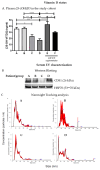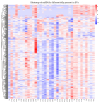Extracellular Vesicle-Enclosed Oxidative Stress- and Inflammation-Related microRNAs as Potential Biomarkers of Vitamin D Responsivity: A Pilot Study on Inflammatory Bowel Disease Patients with or without COVID-19
- PMID: 39334706
- PMCID: PMC11429492
- DOI: 10.3390/antiox13091047
Extracellular Vesicle-Enclosed Oxidative Stress- and Inflammation-Related microRNAs as Potential Biomarkers of Vitamin D Responsivity: A Pilot Study on Inflammatory Bowel Disease Patients with or without COVID-19
Abstract
The relationship between serum 25-hydroxyvitamin D (25(OH)D) levels, genomic response to vitamin D (Vit.D), and positivity to SARS-CoV-2 remains understudied. In this pilot study, during the follow-up of patients with Inflammatory Bowel Disease (IBD) and COVID-19, we investigated this issue by analyzing the molecular contents of serum extracellular vesicles (EVs) from six groups of IBD patients (n = 32), classified according to anti-SARS-CoV-2 status, 25(OH)D level, and Vit.D supplementation, by small RNA-seq. This analysis revealed differentially expressed miRNAs, PIWI-RNA, transfer RNA, small nucleolar RNAs, and protein-coding RNAs in the EVs obtained from these cohorts of IBD patients. Experimental validation evidenced a statistically significant increase in miR30d-5p, miR150-5p, Let-7f-5p, and Let-7a-5p in the anti-SARS-CoV-2-positive and low 25(OH)D and Vit.D supplemented groups with respect to the non-Vit.D supplemented group, indicating their responsiveness to Vit.D treatment. Bioinformatics analysis highlighted the regulation of these validated miRNAs by oxidative stress and inflammation, hallmarks of IBD and COVID-19. Our study reports an unprecedented panel of circulating EV-enclosed inflammation- and oxidative stress-related miRNAs, the potentiality of which, as biomarkers for Vit.D responsivity in IBD patients, needs to be explored in future studies on larger cohorts in order to allow clinicians to optimize current treatment strategies upon viral infection.
Keywords: COVID-19; Crohn’s disease; SARS-CoV-2; bioinformatics; biomarkers; extracellular vesicles; inflammation; inflammatory bowel diseases; oxidative stress; ulcerative colitis; vitamin D.
Conflict of interest statement
The authors declare no conflicts of interest.
Figures



References
Grants and funding
- FAST TRACK COVID 19/Area Science Park and Piattaforma di Genomica del Sistema ARGO with the support of Regione Autonoma Friuli Venezia Giulia, Ministry of University and Research and Ministry of Economic development
- Ricerca Locale/Ricerca Locale - Linea A - Department of Veterinary Sciences, University of Torino
LinkOut - more resources
Full Text Sources
Miscellaneous

